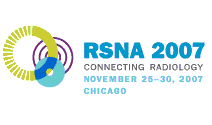
Abstract Archives of the RSNA, 2007
Koshi Ikeda MD, Presenter: Nothing to Disclose
Naoto Ohmura MD, Abstract Co-Author: Nothing to Disclose
Hiroaki Kurokawa MD, PhD, Abstract Co-Author: Nothing to Disclose
Atsushi Komemushi MD, PhD, Abstract Co-Author: Nothing to Disclose
Yoko Harima MD, PhD, Abstract Co-Author: Nothing to Disclose
Satoshi Sawada MD, Abstract Co-Author: Nothing to Disclose
Minoru Maehara, Abstract Co-Author: Nothing to Disclose
et al, Abstract Co-Author: Nothing to Disclose
et al, Abstract Co-Author: Nothing to Disclose
Most surgeons want to know about the location of a parotid tumor before performing surgery, because the management can change according to the tumor location to preserve the function of the facial nerve. We examined whether parotid tractography using a 3-tesla MR unit would be clinically useful to discern between deep or superficial lesions.
Three volunteers and 6 patients underwent cervical MRI. Patients subsequently underwent surgical resection at our hospital and parotid tumors were proven histologically. MR images were obtained on a 3-T unit using a neck coil. We reviewed T1- and T2-weighted axial images, 3D-SPGR thin slice axial images (1-mm slice), and diffusion tensor images in all cases. We also performed parotid tractography. We assessed 3D-SPGR thin slice images and parotid tractography by predicting the running course of the intra-parotid facial nerve.
Using parotid tractography, the locations of the parotid gland tumors (5 superficial lobes and 1 deep lobe) were correctly diagnosed in all 6 cases. Furthermore, when we used 3D-SPGR thin slice images, correct prediction was made in all cases. When we used parotid tractography, the relationships between the facial nerve and tumors were identified in all cases.
We are able to perform parotid tractography by predicting the running course of the intra-parotid facial nerve. When we use parotid tractography, we are able to correctly diagnosis the location of parotid gland tumors.
When we use parotid tractography to predict the running course of intra-parotid facial nerve, we are able to examine the correct location of parotid gland tumors.
Ikeda, K,
Ohmura, N,
Kurokawa, H,
Komemushi, A,
Harima, Y,
Sawada, S,
Maehara, M,
et al, ,
et al, ,
The Location of Parotid Gland Tumors: Evaluation with Parotid Tractography Using 3-tesla MRI. Radiological Society of North America 2007 Scientific Assembly and Annual Meeting, November 25 - November 30, 2007 ,Chicago IL.
http://archive.rsna.org/2007/5005829.html

